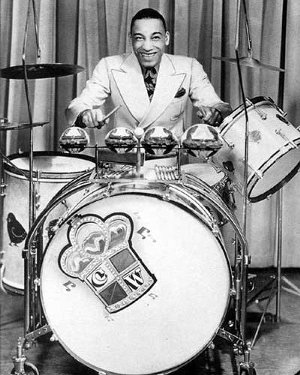Chick Webb

-
Birth Name
William Webb -
Born
February 10, 1909
Baltimore, Maryland -
Died
June 16, 1939 (age 30)
Baltimore, Maryland -
Featured Vocalists
Ella Fitzgerald
Chick Webb was one of the finest jazz drummers of the big band era and also one of the most inspirational. Crippled by spinal tuberculosis, which left him with minimal use of his legs and a hunched back, Webb overcame his handicap to lead one of the swingingest orchestras of the 1930s. At less than five feet tall, he reigned over the Savoy Ballroom during its heyday and is often credited with the discovery of singer Ella Fitzgerald.
Born in Baltimore in 1909, Webb learned to drum at an early age as therapy for his condition. While still a teenager, he landed a spot in the Jazzola Orchestra. When Jazzola member John Truehart moved to New York in 1925 he took Webb with him. There the young drummer worked briefly with Edgar Dowell and played in sessions with such artists as Johnny Hodges, Benny Carter, Tony Hardwick, and Duke Ellington before forming his own five-piece group in 1926, which spent five months at the Black Bottom Club. He then led an eight-piece outfit at the Paddock Club before taking his group, now called the Harlem Stompers, to the Savoy in January 1927. During the rest of the 1920s, Webb and his band, by then expanded to eleven pieces, played various nightspots around the New York area, including the Roseland, the Cotton Club, and the Strand Roof. In the early 1930s, they toured with the Hot Chocolates revue.
In 1931, Webb and his Stompers began the first of several long, regular seasons at the Savoy. This arrangement lasted until 1935. When not at the Savoy they continued to tour. In 1932, they played a series of theater dates with Louis Armstrong, and in 1934 they were booked into a long engagement at the Casino de Paris in New York. The band’s sound and Webb’s showmanship quickly attracted a large following, and the group changed its name to the Chick Webb Orchestra.
Webb’s line-up at times featured such top musicians as Carter, Edgar Sampson, John Kirby, and Louis Jordan. Charlie Linton was sole lead vocalist until 1935 when Webb came under pressure to hire a younger, hipper singer. Webb’s frontman Bardu Ali heard 17-year-old Ella Fitzgerald perform at the Harlem Opera and brought her to Webb for an audition. She proved a star attraction for the orchestra, and in 1937 it began to gain national fame. Webb used his white arranger, Van Alexander, then known as Al Feldman, to work with Fitzgerald, writing and arranging songs specifically for her. Together, Alexander and Fitzgerald wrote the band’s biggest hit, “A-Tisket, A-Tasket.” Fitzgerald was an orphan and Webb came to regard her as his own daughter, legally adopting her soon after she joined the band. Linton remained as male vocalist through at least early 1937. Trumpet player Taft Jordan also sang, as did Louis Jordan.
Webb’s orchestra remained highly popular throughout the 1930s, winning a battle of the bands against Benny Goodman in May 1937. Webb himself was the consummate drummer, raising the standard for all with his inventiveness and expertise. He made full use of his instrument and was a master of the high-hat cymbal. Webb’s musicianship inspired many other performers, including rival drummer Gene Krupa and future Jazz Messenger Art Blakey. Webb never learned to read music but was capable of perfectly memorizing every detail of the band’s arrangements. He rarely missed a beat.
In 1938, Webb’s health began to fail him. He often had difficulty finishing performances and ended up in the hospital several times. Despite his physical frailty, he continued to tour and record with his orchestra. In June of 1939, however, he became seriously ill and entered the hospital for the last time. He passed away after undergoing a major operation, his mother at his side. Fitzgerald took over Webb’s orchestra and kept it going under her own name but gave it up in mid-1942 to go solo. The group tried to stay together under another leader but soon disbanded.
Sources
- Simon, George T. The Big Bands. 4th ed. New York: Schirmer, 1981.
- “New Acts-Band Reviews.” Billboard 6 Feb. 1937: 20.
- “Call Out Riot Squad To Handle Mob At Goodman-Webb Battle.” Down Beat Jun. 1937: 1.
- “The Rise Of A Crippled Genius.” Down Beat Dec. 1937: 14.
- “Dies at 30.” Down Beat Jul. 1939: 1.
- “Will Ella Take Over Webb Ork?” Down Beat Jul. 1939: 1.